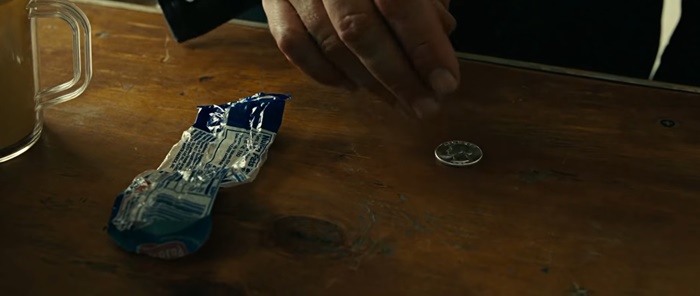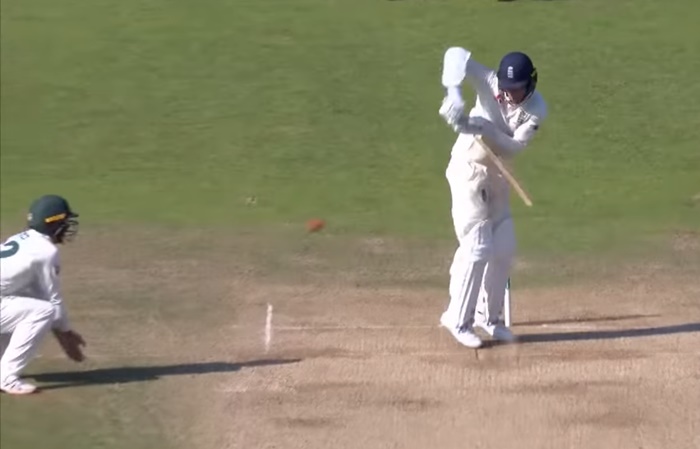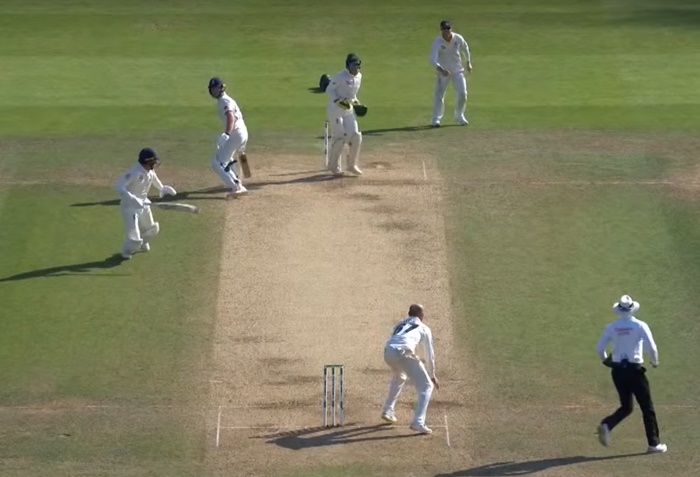England v Australia, third Test, day four
It’s six or out…
…
It’s six!
Jonathan Agnew, Test Match Special
Have you seen No Country For Old Men? You should watch No Country For Old Men.
No Country For Old Men is a striking and excellent film and while the ending is not immediately satisfying, that’s kind of the point. You’ll find you think about No Country For Old Men a fair bit more than the average film after it finishes.
One of the most exciting scenes involves Javier Bardem’s Anton Chigurh tossing a coin.
Heads or tails is not an especially exciting thing in itself. This coin toss is exciting because there’s something riding on it. Quite a lot in fact. No-one states it explicitly, but it is very clear that for this particular coin toss, the gas station attendant’s life is at stake.
Heads or tails?

Imagine that. A coin in the air and just two possible outcomes, one of which is unthinkable.
Watching the film, you feel this. It’s horrible, but it’s exciting.
Jeopardy
It was pointed out to us recently that we use the word ‘jeopardy’ a hell of a lot more than the average person. Despite this, the word is almost exclusively reserved for when we’re talking about cricket.
Jeopardy is at the heart of cricket drama. It is the reason why a six during a Test match run-chase with nine wickets down is infinitely more exciting than a six in the first over of a limited overs match.
Test Match Special commentator Jonathan Agnew put it best at the end of the 2019 Headingley Test. England were eight runs from victory and Australia were one wicket from victory and Ben Stokes had just launched the ball into the air.
“It’s six or out…” he said, and as the ball sailed through the air, all we could do was ponder which.

Imagine that: the ball in the air and just two possible outcomes, one of which is unthinkable.
Watching or listening, you felt it. You felt it so much more because of what was at stake. It was horrible, but it was exciting.
A six is not a six
The shortest formats are specifically engineered to encourage batsmen to try and hit sixes; to make them feel safe to do so. With ten wickets to use in 20 overs (or 100 balls), they can hit with near impunity.
But you can’t buy excitement so easily. By reducing the jeopardy, you also diminish the six. It’s not the fact that it arrives more frequently – it’s because of what’s at stake.
Imagine that before he tossed the coin, Chigurh had told the gas station attendant that it wasn’t all on this one toss; that he was willing to give him a good few chances and he’d toss several times.
The scene’s not quite so tense now, is it? It’s not quite so exciting.
No shortcuts
This is not to lay into the T20 format like there’s nothing of merit there. The aim here is to celebrate Test cricket and point out that its epic nature and long hours are precisely what help it transcend other sport.
You can’t strip away all but the most exciting 100 deliveries and expect a match to feel the same.
There are no shortcuts. Context is everything.
Take Ben Stokes, for example. The Ben Stokes story starts way back, but even if we limit it to this one Test match alone, he has a back story.
He is the guy who played a shit shot in the first innings when England were bowled out for 67.

He is the guy who bowled a leviathan of a spell and took crucial wickets when England found they were running out of fit bowlers in Australia’s second innings.
He is also the guy who had made three runs off 72 balls before he finally hit a boundary.
It all matters, but that last one is the biggie really. Taken in isolation three runs off 72 balls is not especially exciting. It was, in fact, excruciating to watch and doubtless just as excruciating to produce.
But it added to what was to come. The fact that Stokes played like that despite not knowing that it would add to what was to come only serves to elevate the importance of that passage of play further.
Ben Stokes made that investment against the odds and if you watched him, hoping that he would ultimately succeed, you made an emotional investment against those same odds.
The other hero
Superheroes are dull when they can do anything. The most memorable heroes are human and vulnerable. Cricket delivers this brilliantly because it always has the least competent batsman at the crease when the stakes are highest.
If you’re going to fail, fail early, because there is nothing more painful than getting close and losing. Nine wickets down, one shot from victory, both teams are as close to victory as it is possible to be. With all the work to get to that position, all that emotional investment, losing doesn’t come more painful.
Precisely because of this, the tension rises. Tension rises and the guy who’s batting now is the worst batsman of all – which only raises that tension further.

Number 11s are elite cricketers. They are elite bowlers who are also obliged to do a job for which they have no exceptional competence whatsoever.
They are fallible. This is why nine-wickets-down jeopardy is the greatest sporting jeopardy of all.
A top order batsman might thrill you with a lofted drive, but every single delivery a number 11 faces is a coin in the air with everything at stake. And in a Test match, it can go on like this indefinitely.
On day four of a five day Test match, there was no deadline in sight for Jack Leach. He had to block, he had to survive, and he had to keep on surviving while Ben Stokes accelerated time from the other end.

That No Country For Old Men scene is four minutes long and we don’t see the gas station attendant beforehand. All we know of him is what we see in that scene. That’s our entire emotional investment and yet those few seconds before he calls heads are excruciating.
A Test like Headingley 2019 provides a lot more back story than that, but the protracted tension of the climactic moments feeds into our emotional investment too.
Ben Stokes and Jack Leach batted together for an hour and every minute of that hour was more exciting than the last.
Heads or tails, we wondered.
First published in August 2019.
If you enjoyed this article, why not sign up for our email? Find out all about that here.






No Country for Old Men is also an excellent book, if anything even bleaker than the film, but with far more emphasis on Sheriff Bell. There may be a metaphor there, but it would be quite a reach
I would like to inject some extra dose of jeopardy by letting fielding teams have unlimited reviews, but every time an appeal is rejected and original field umpire’s decision is upheld, they should be docked 5 extra runs as penalty
(more jeopardy can be added by increasing penalty for every rejected appeal
Say 5 extras for 1st rejected appeal
10 extras for 2nd rejected appeal
15 extras for 3rs rejected appeal and so on)
Batsmen don’t have any appeals but umpires can self review like they do the no-ball check today
Imaging a situation of 2 to win, last wicket and LBW appeal not given by field umpire (like what happened with Stokes)
Would the fielding captain take the appeal in this case?
That would be an incredibly unsatisfying way to end such a tense passage of play though would it not? Extras awarded due to a poor review, following protracted replays, rather than Stokes hitting the winning runs.
Yes, it would be an unsatisfactory ending
And worse, given the ambiguities in the technology/process, it could become a controversial ending too
Maybe it is one for the shorter formats. All this artificially induced drama goes well with shorter formats
Excellent!
Thank you.
We should add that this is the kind of thing we’ll try to do more of if we can get enough funding when we finally get round to launching the Patreon crowdfunding thing.
idea; replace bats with cattle guns.
Yes, yes, yes, oh yes, yes, oh yeh, yes, oh yeh, oh yeh, yeeesss, yeeessssss, Ian Austin, YEEEESSSSS, YYYYEEEEEEEEEESSSSSSSS!
I was just going to say I agree with you, but that comes nowhere near describing the level of agreement I am feeling. So you can have my special “I very much agree with your opinion / this course of action” phrase, rarely heard outside of Morrisons.
No need to thank me, is usually the next thing I say.
Cheers?
In conversation with Jonathan Agnew on View from the Boundary, Miles Jupp exclaimed, “Where’s Ian Austin?” In a disparaging tone, Aggers retorted, “Ian Austin.” I guess, after Bert’s remarkable disclosure, we need look no further.
There’s been some very good writing in the wake of The Miracle of Headingley. Adding this to the pile. Chapeau, as the Europeans say.
Thank you. Nice to get a response when we’ve made more of an effort.
It’s been good to sample your longer stuff on other sites, but there’s still no experience to compare with reading a heartfelt longread here at the Home of (King) Cricket. Bravo.
Thanks very much. Writing here is simpler, in that nothing needs to be tweaked to fit someone else’s publication. Nor do we have to try and explain the piece before we’ve written it, which can sometimes be the hardest part when it’s something longer and more open-ended.
As we said above, if we can get some funding via the crowdfunder, we can hopefully sit down and do this kind of thing a little more often because we’ll know we aren’t just wasting time that we should be spending writing for someone else.
I too agree with the sentiments expressed here, but nowhere to the extent of Bert. That’s just unhealthy.
Yours is the correct, healthy level of appreciation and we are grateful without being at all unnerved.
As much as I love the general goofy demeanor, funny regular posts (Does that fellow like cricket yet?), and delightful commenters, when you write about Test cricket like this is always really special. The ‘Why Test cricket can never die’ post played no small part in me getting into the sport, although I probably read it in 2012 (there was also a long conversation with my ex’s late father about how important the ball aging was and footmarks, I assume I was captivated due to the strength of his homebrew beer).
Bravo!
The idea that we could influence a person is remarkable to us. If any person is even slightly into cricket even remotely because of us then that is an unqualified triumph.
We do need to speak to Prince Prefab as well. We’ll add it to our ‘to do’ list.
Very well writ, KC.
One additional point, which builds on the excellent points you make, is how very rare a test match win by 1 wicket is. Far rarer than a win by a handful of runs.
For the side batting last in a tight finish, the target seems to get harder to reach the closer you get to it in a sort-of cricketing variant of Zeno’s paradox.
Before Sunday, England last won a test match by one wicket in 1923. That 4th innings, 10th wicket stand of 76 has only been exceeded twice in all first class cricket, anywhere, ever.
It almost defies words, but you have found a heap of good words about it today, KC. Thank you for that.
That’s true. There’s usually a period where the batting side feel a bit more nothing-to-lose and the bowling side feel a bit more a-great-deal-to-lose, but as the target nears the emphasis changes.
A great read, KC.
Thank you.
I’ll use this to save in people’s face when I try to tell them about ‘proper cricket’ and they just say five days? What?
Philistines. (Which would actually be a very short word beginning with c if this wasn’t a public forum)
Even the argument in Test cricket’s favour takes a long time. It is not for the impatient.
Great read. One of the best in the post-mortem I’ve carried out since Sunday.
Very good read thank you KC.
What was everyones favorite piece they’ve read? I really enjoyed Geoff Lemons and Greg Baums pieces.
Cheers Bradders.
Perfect, thank you.